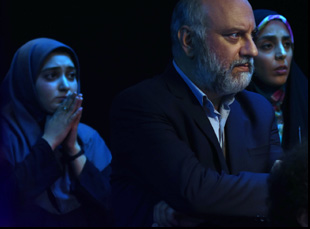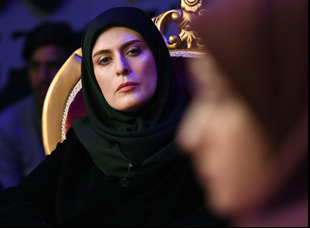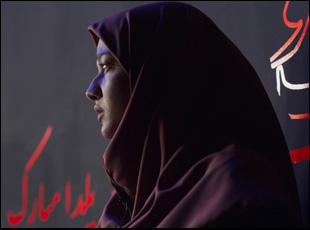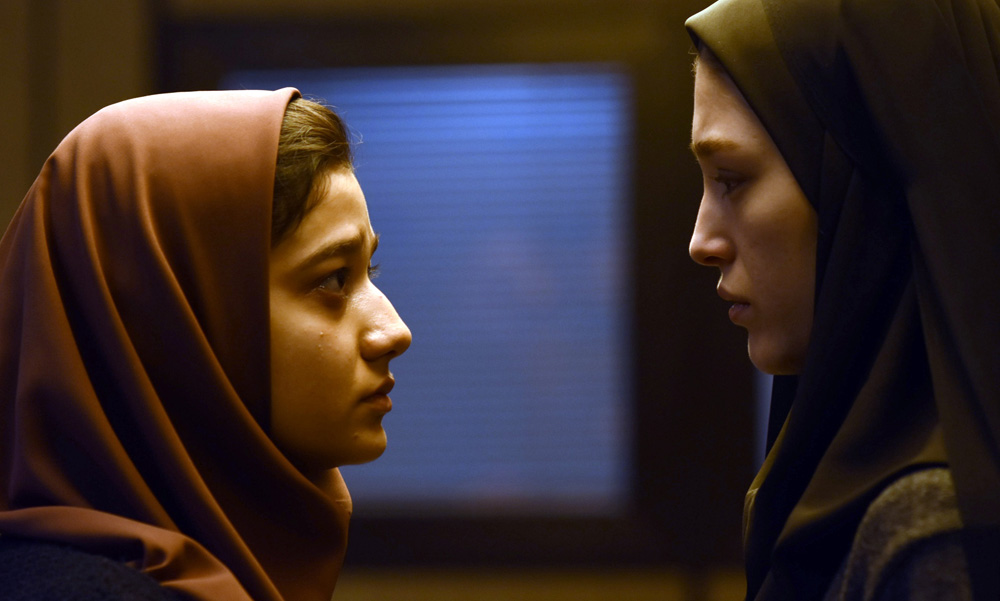Although there appears to be no reality show concept that can be too extreme, Massoud Bakhshi had still been surprised to turn on the TV and find a program called “Honeymoon” airing in his native Iran that took the tradition of the winter solstice festival known as Shab-e Yalda where aggrieved parties would meet with each other to offer forgiveness to one another and turned it into compulsive viewing, complete with musical performances. While Bakhshi’s narrative debut “A Respectable Family” had been banned in the country, telling the story of a professor who had relocated to Europe and had trouble getting back into Tehran when his father takes ill, what he was watching felt truly obscene as one tragic situation after another was presented as entertainment for an audience, with those suffering immense trauma thrust into the spotlight as if they were contestants on a game show.
“Yalda, A Night for Forgiveness,” which took home the Grand Jury Prize for World Cinema at Sundance earlier this year, imagines what it looks like behind the scenes of such a show, with Massoud introducing a storyline that he had been researching for some time about a woman who gives birth while awaiting her execution after she is held responsible for the accidental death of her husband. A baby is nowhere to be seen at the start of “Yalda,” but that is only part of the burden that a young, once expectant mother named Maryam (Sadaf Asgari) carries onto the set of “The Joy of Forgiveness” where her last chance of clemency for the murder of her husband Nasser depends on her apology to his daughter Mona (Behnaz Jafari), who is incentivized to come on the show for the blood money she’ll receive if she accepts Maryam’s plea for absolution.
The premise is grotesque when Maryam doesn’t feel she should bear any responsibility for Nasser’s death and there’s no apology Mona would likely find acceptable, but Bakhshi elegantly slips in and out of one area of the studio to another to consider the conditions that have led to the existence of the show when justice has become less a resolution for the people involved than the public at large and the inequities throughout Iranian society in terms of gender and class push Mona and Maryam into agreeing to put themselves through such desperate straits. “The Joy of Forgiveness” may make for an evening in which 30 million viewers can’t turn away, but “Yalda” yields something longer lasting as a peek behind the curtain where one sees the ugliest of ancient attitudes slyly finding their way into a country that wants to be seen as dynamic and contemporary, yet the modern advent of reality TV only reinforcing the oppressive power structures that have been around since the dawn of civilization.
With “Yalda, A Night for Forgiveness” now arriving in virtual cinemas, Massoud recently spoke about how he also leaned on tradition in working to find something fresh to say with what is a good old-fashioned chamber drama in its bones, how the contrasting acting styles of his two leads gave the film a unique energy and why he insisted on filming the indoor story in Iran.
I’m actually a documentary filmmaker and whenever I need to tell a story in a fiction way, I try to be close to the reality. I don’t see any difference between documentary and fiction, and with “Yalda,” I saw these documentaries some years ago and these painful stories remain within me, so I wrote the story of this young wife being convicted of accidentally killing her husband. The first draft of the script was written really focused on her, and in some flashbacks, I tried to tell the whole past story, but once I saw this TV reality show in the Iranian television, I decided to place the story in the frame of one episode of this show. Basically, this show was about forgiveness, but not necessarily about the crime cases. Yet the most interesting episodes were [involved] criminal cases – victims’ families or criminals in a reality show and the host asks them [to give or accept forgiveness] and it was so shocking to me that I decided to change radically the structure of my film and to tell the story through this reality show. Right after the production of my film, the existing show was stopped — fortunately. [laughs]
Could you actually research the show?
I did research on the subject mainly through lawyers and advocates because as you see the story is really linked to the details of the law and this punitive system. For this, I needed to know the law and the way they judge each different case and investigate and analyze AND then for the show, it was a hit and its host was a star, but it was somehow difficult to have the access to the existing show, so I visited other reality shows. I had fortunately had some friends who were working as producers or directors and they led me to visit some of the backstage of some of these programs. Because of them, I changed in my script a very important detail because at the beginning, I wrote a a show produced mainly by men and then going to visit Iranian TV, I noticed most of the people working behind the scenes of these programs were female. I even invited a director/producer of the TV [show] and the fact that she came to join our team helped us a lot for every detail to be authentic during the production.

But the character of Ayat, I have to say is the most enigmatic character of the film, and I had this block actually to find the right actor for this role. You see that he represents the power, but Babak Karimi, who plays this role, really got the deeper layers of the character. Generally speaking, we discussed a lot with all of the actors and actresses about the background of each character and these kinds of stories happening in our society. That’s why the fight that exists between this producer and the woman who represents the TV station, she’s there for controlling the ideology of this production somehow, and we can feel that the man, Ayat, is representing the absolute power. He has everything in his hand, even in the most crucial and critical moments of the show, and I think these are the details that might be very interesting for the audience to want to know better a very complex society, which is Iran today.
You’re able to capture that complexities in individual frames where the modern is consistently clashing with the traditional visually – as a Westerner, this is unexpected, though was it naturally occurring?
Yeah, this is a film about the huge contrasts that exist not only between the two main characters — not only between Mona and Maryam, who are coming from two different social classes opposing each other, one poor, the other one rich — and not only between what you see on the stage with these bright and vivid colors and happy atmosphere you see on stage and the tragic story that’s happening backstage in the dark corridors with these shaking handheld camera shots. It’s also on a bigger scale about the contrasts between modernity and tradition we have in Iranian society. From the beginning, it was clear to me that I want to show this part of the modernity of this very complex society because even as an Iranian based there, I didn’t know before going to visit the backstage of the TV reality show [such things as] there being so many women active and involved in the production, and I think the film reflects all of these contrasts. It is not necessarily the image that exists of Iran, as you said, in the Western world.

As a documentary filmmaker, I really wanted to shoot in a real TV studio and I insisted for it for something like one year. I visited a lot of TV studios and to my great regret, I found out there is a huge mass production in Iranian TV, so there are no TV studios for us to shoot there over a month. We could rent something for one week, but not for a month, so we invented our own TV studio in a huge theater complex in the south part of Tehran and constructed every detail. I remember some time in this long production, [our] European co-producers of the film wanted me to shoot outside of Iran. They used to say, “This is a film in one location. You can make this studio everywhere you want.” But I said, “Shooting this film outside of Iran has no meaning for me because I cannot believe this story I’m telling.”
Although you cut away from the show during the film to go behind-the-scenes, would the scenes for the TV show play out in real time, like the exchange between Mona and Maryam to keep the intensity high?
Technically, we didn’t have the huge studio for a long time. We had it for something like a week and I was obliged to shoot the scene [with Mona and Maryam] with five ALEXA cameras. We had not so many takes, but we did takes in 30 minutes without cuts. This needed the huge energy of every actress and I remember the two actresses [playing] Mona and Maryam were really very well-prepared, even if they were coming from two different generations. It was very interesting to me working with both of them because Behnaz Jafari, who is playing Mona, is a very well-known, strong actress who did a lot of films [such as] Jafar Panahi’s last film “3 Faces,” while Sadaf Asgari, who plays Maryam, is from the new generation of Iranian actresses. She had only played in one film, her uncle’s film, and to the contrary of Behnaz, she wanted to keep her energy only for the takes. She didn’t want to rehearse or repeat [scenes], so it was very beautiful to see the combination of these two different approaches to acting and it worked very well. And I wanted to do more takes, but [the actresses] were really efficient and that week was the most exhausting for the actresses.

It’s very, very heartwarming because my first film was banned. It was never released in my home country and that was the saddest experience that I had in all of my life. It was not only banned but created lots of problems and that’s probably why I wanted “Yalda” to be first shown inside of my country and then starting its European and world releases outside. But it’s very, very nice to see different people from different cultures react to the film and that the film can communicate with different people. I had a very, very good response at the Berlin Film Festival, talking to the audience, and I think [it’s] the fact that the central theme of the film is forgiveness, which is something very, very essential and important in our contemporary world. This is a film that asks a lot of questions and provokes the audience to find the answers themselves and that’s the reason why it can communicate with the people.
“Yalda, a Night for Forgiveness” will open on December 11th in virtual cinemas.





